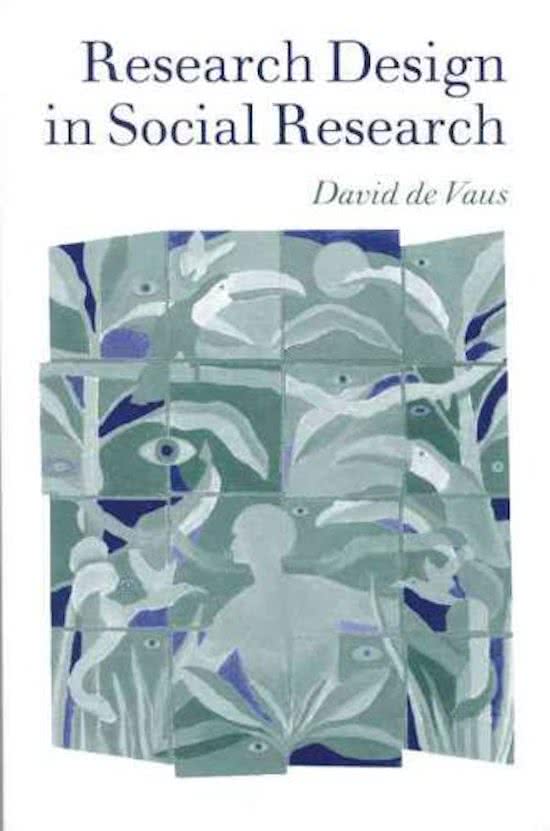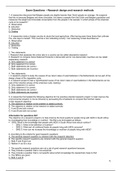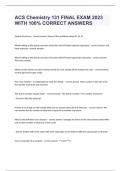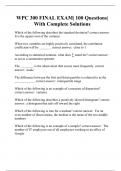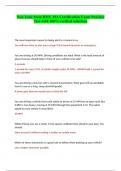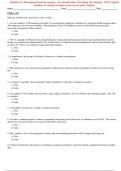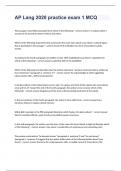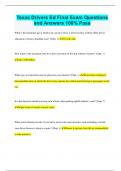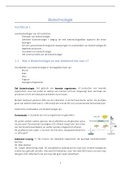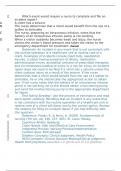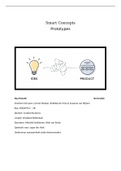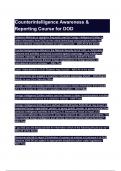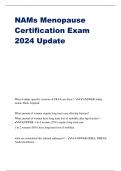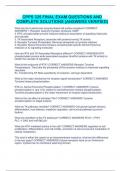1. A researcher discovers that Belgian people are slightly heavier than Dutch people on average. He suspects
that this is because Belgians eat more chocolate. He draws a sample from the Dutch and Belgian population and
measures the weight and chocolate consumption from the people in his sample. In which phase of the empirical
cycle is his research?
A. Observation
B. Induction
C. Deduction
D. Testing
2. A researcher visits a foreign country to study the local agriculture. After having seen three farms that cultivate
rice, she says to herself: ‘This must be a rice cultivating country’. Her reasoning is best described as:
A. Observation
B. Induction
C. Deduction
D. Testing
3. Two statements:
I. Research that assesses the crime rate in a country can be called descriptive research
II. Research to compare Gross National Products in democratic and in non-democratic countries can be called
explanatory research
A. Only statement I is correct
B. Only statement II is correct
C. Both statements are correct
D. Both statements are incorrect
4. Two statements:
I. A research project to study the causes of low return rates of used batteries in the Netherlands can be part of the
design phase of the regulative cycle.
II. A research project to test a hypothesized cause of low return rates of used batteries in the Netherlands can be
part of the induction phase of the empirical cycle. (testing)
A. Only statement I is correct
B. Only statement II is correct
C. Both statements are correct
D. Both statements are incorrect
5. A researcher formulated the following objective for her practice-oriented research project: to help improve the
environmental situation in Accra (Ghana) by persuading the inhabitants to compost their kitchen waste.
In this research objective:
A. The objective in relation to the problem is stated correctly
B. The objective in relation to the research is stated correctly
C. A and B are both correct
D. A and B are both not correct
Information for questions 6&7
The objective of a research project is to help improve the food quality for people living with AIDS in South Africa
by investigating their knowledge on nutrition. The RQ’s are formulated as follows:
GRQ: What is the knowledge that people with AIDS in South Africa have about nutrition?
- SRQ 1: What is the definition of nutrition?
- SRQ 2: What sort of nutritional foods do people living with AIDS consume?
- SRQ 3: How can we increase the knowledge on nutrition of people living with AIDS?
6. According to the criteria for good research questions:
A. The general research question is coherent with the research objective
B. The specific research questions are coherent with the general research question
C. Both A and B are true
D. Neither A nor B is true
7. The specific research questions are not a set of good research questions because:
A. They include a question that is non-empirical
B. They include a question that is not specific about which knowledge the researchers hope to find
C. The SRQ’s are good
D. Both A and B
1
, 8. A researcher wants to validate her questionnaire assessing attitude towards brands. Fortunately, she also has
access to a list of products that each of the 200 customers has bought over the last ten years. Based on the
assumption that customers who have a positive attitude towards a brand will buy more of the brand’s products,
the researcher compares the list of products that the customers bought to their responses on the questionnaire.
Which type of validity is tested?
A. Content validity
B. Criterion validity
C. Construct validity
D. None of the above
Concept = attitude (towards brands) and there is information about behavior, the attitude is related to behavior.
9. RQ: Which factors impact the economic position of small farmers in Ghana? In this research question, the
concept ‘economic position’ is measured on:
A. Nominal measurement level
B. Ordinal measurement level
C. Ration measurement level
D. Undecided measurement level (you cannot know)
10. Hypothesis: Lowering the prices of organic products will lead to an increase in their sales. What kind of
hypothesis is this?
A. Non-relational
B. Correlational
C. Developmental
D. Causal
11. An ice cream company wants to increase sales by showing a TV commercial. To investigate whether it has
the desired effect, the company compares the sales in February (right before the commercial is aired) with those
of half a year later. The results show that the sales have gone up.
This research primarily suffers from poor:
A. Reliability
B. Content validity
C. Internal validity
D. External validity
12. A researcher wants to understand how cocoa farmers in Ecuador feel about the use of sustainable cultivation
methods. He decides to draw a sample from these farmers to interview them. Because it is raining a lot and he
hates getting wet, he only interviews farmers that live close to his hotel.
This research primarily suffers from poor:
A. Reliability
B. Construct validity
C. Internal validity
D. External validity
13. Two statements about experimental designs:
I. Classical experimental designs have good internal validity
II. In a field experiment there is no manipulation by the researcher
A. Only statement I is correct
B. Only statement II is correct
C. Both I and II are correct
D. Neither I nor II is correct
Information for questions 14&15
In order to investigate the opinion of households in Kampala (capital of Uganda, Africa) about the services
rendered by waste collectors, 5 different city blocks from Kampala are randomly chosen from a complete list of
city blocks. From each selected city block 20 households are randomly chosen and the heads of household are
interviewed about the services rendered by waste collectors to their households. The following two questions are
about this example.
14. This type of sampling is called:
A. Simple random sampling
B. Systematic random sampling
C. Cluster sampling (multi-staged)
D. Stratified random sampling
2

